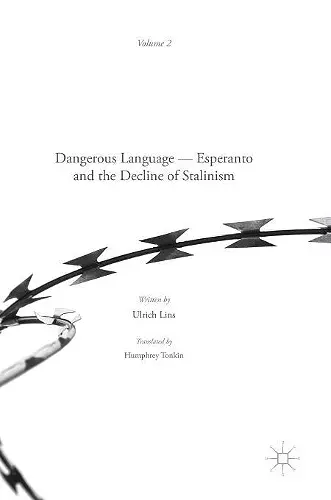Dangerous Language — Esperanto and the Decline of Stalinism
Ulrich Lins author Humphrey Tonkin translator
Format:Hardback
Publisher:Palgrave Macmillan
Published:20th Feb '17
Currently unavailable, and unfortunately no date known when it will be back
This hardback is available in another edition too:
- Paperback£24.99(9781349958016)

"The history of Esperanto is usually related by Esperantists, for Esperantists - and in Esperanto. This expanded translation of Ulrich Lins's decades of research into the persecution of Esperantists makes for fascinating reading well beyond that community. Esperanto has no homeland, and for that very reason drew the ire of nationalists and other ideologues from across the political spectrum. This is, in short, nothing less than an alternative history of nationalism." (Michael D. Gordin, Rosengarten Professor of Modern and Contemporary History, Princeton University, US) "This book gives a carefully supported account of a crucial aspect of the Esperanto movement's history, focusing on political repression by totalitarian regimes, especially those of Hitler and Stalin. It also sheds light on opposition elsewhere and is eye-opening for anyone interested in language policy and global communication." (Ulrich Ammon, Emeritus Professor of Germanic Linguistics at Duisberg-Essen University, Germany)
This volume is complemented by the sister volume Dangerous Language — Esperanto under Hitler and Stalin which offers a concentration on the creation and early emergence of Esperanto as an international language.
This is Volume 2 of Dangerous Language. This book examines the rise of the international language Esperanto, launched in 1887 as a proposed a solution to national conflicts and a path to a more tolerant world. The chapters in this volume examine the position of Esperanto in Eastern Europe during the Cold War; in particular it explores Stalin’s final years and the gradual re-emergence of the Esperanto movement. At first, its revival was limited to the satellite countries, especially Bulgaria and Poland, but, with Stalinism’s gradual retreat, Esperanto organizations reappeared in most East European countries and eventually in the Soviet Union itself. The progress was uneven, and its details reveal the stresses and strains that became apparent as the solidarity of the Soviet bloc declined. This book will appeal to a wide readership, including linguists, historians, political scientists and others interested in the history of the twentieth century from the unusual perspective of language. This volume is complemented by the sister volume Dangerous Language — Esperanto under Hitler and Stalin which offers a concentration on the creation and early emergence of Esperanto as an international language.
ISBN: 9781352000191
Dimensions: unknown
Weight: unknown
198 pages
1st ed. 2017